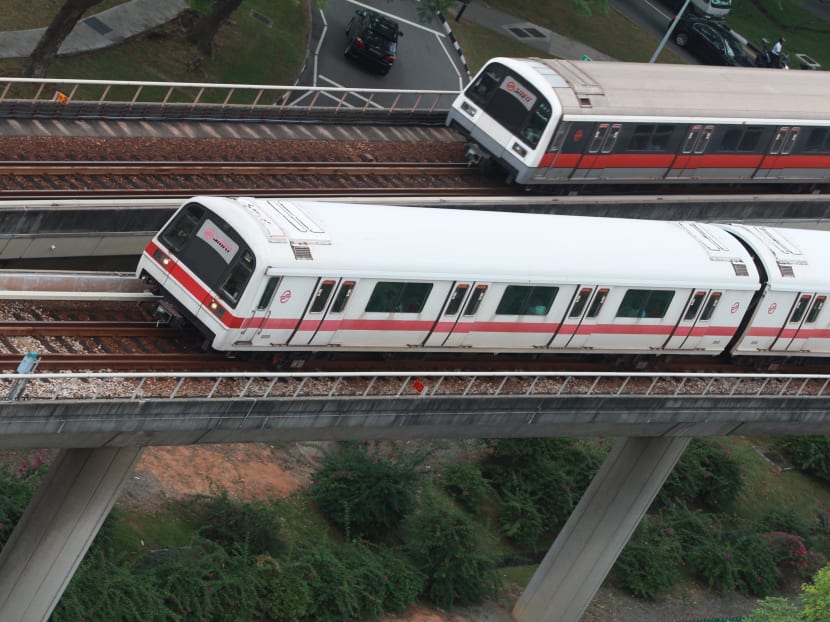LTA to buy SMRT assets for S$1 billion under new financing framework
SINGAPORE — After almost five years of negotiations, rail operator SMRT has worked out a new financing framework with the Land Transport Authority (LTA) that will allow it to focus on providing reliable and well-maintained rail services.
SINGAPORE — After almost five years of negotiations, rail operator SMRT has worked out a new financing framework with the Land Transport Authority (LTA) that will allow it to focus on providing reliable and well-maintained rail services.
Under the deal, the LTA will buy SMRT’s operating assets — for the North-South and East-West lines, the Circle Line and the Bukit Panjang Light Rail Transit — worth S$1.06 billion. The deal will take effect on Oct 1, if SMRT shareholders approve. The assets include trains and the power supply and signalling systems.
The deal will free SMRT from hefty capital expenditure and large fare revenue risks, but it will have to meet a new set of maintenance performance standards spelt out by the regulator. The operator will be fined for any breach.
Both parties and Transport Minister Khaw Boon Wan said the transfer of assets to the New Rail Financing Framework would benefit commuters. This is because the LTA will be able to add trains to respond more quickly to ridership demand, and replace and upgrade rail assets in a more timely way, said Mr Khaw, who is also Coordinating Minister for Infrastructure. The result should be a more reliable rail system that is less crowded.
But the LTA was quick to say the Government was not nationalising the rail sector, as private rail operators continue to run the rail services.
SMRT said the current rail financing framework has become “unsustainable”. Rail fare margins have been declining since Financial Year 2012, as more rigorous maintenance and replacement regimes increased operating expenses. Actual fares have not kept pace with what was allowable under the Public Transport Council’s fare adjustment formula, the firm added.
Train fares will not be affected by the transition to the new financial framework, said the LTA. The current fare adjustment formula — which takes into account the consumer price index, the wage index and cost changes in electricity and diesel — is valid until 2017, it said.
The New Rail Financing Framework was first implemented for the Downtown Line — operated by SBS Transit — in 2011. Under the new framework, operators get shorter licences of 15 years instead of 30 to 40 years under the current framework. Operators pay a licence charge for the right to run the rail lines and share some risk with the LTA.
In the case of the Downtown Line, SBS Transit is expected to pay a licence charge of about S$1.6 billion over 19 years, LTA said previously. For SMRT’s rail lines, no estimate of the licence charge was provided by the LTA or SMRT on Friday (July 15).
Asked why negotiations took so long, SMRT president and group chief executive Desmond Kuek said it was an intricate and complex process, and the risk-sharing mechanism had to be sustainable for all parties.
The licence for SMRT to operate the rail lines under the new framework will run until Sept 30, 2031, with a possible five-year extension. The licence charge is structured for SMRT to achieve earnings before interest and tax (EBIT) of about 5 per cent on average. This margin is comparable with asset-light rail operators overseas, said the LTA.
Under the licence charge structure, SMRT will pay a smaller fee to the LTA if revenue falls below a certain threshold. If its EBIT margin exceeds 5 per cent, profits will be shared with LTA; if EBIT margins fall below 3.5 per cent, the shortfall will be shared with the LTA. The licence charge will go into a Railway Sinking Fund set up for future expenditure on operating assets.
To meet the new maintenance performance standards, SMRT will bump up maintenance staff strength by 20 per cent, or about 700 employees, over the next three years. In turn, the LTA will hire more people for its maintenance and engineering team and step up checks and audits.
As part of the transfer, the LTA will audit SMRT’s financials for trains and the light rail system to verify the net book value of operating assets. It will also survey the condition of older assets to ensure they are in acceptable condition. SMRT has provided warranties on the condition of assets and the LTA said it was entitled to withhold payments for assets that need rectification or replacement.
SMRT’s independent financial adviser, PrimePartners Corporate Finance, has said the terms of the proposed sale are “fair and reasonable”.
SMRT’s Mr Kuek said: “We welcome the transition of our lines to the new rail financing framework. This will allow SMRT Trains to better focus on fulfilling its role as a public transport operator to deliver high levels of operational reliability, safety, and service for the benefit of our commuters.”
Going forward, the LTA is in discussions with SBS Transit on shifting the North East Line and Sengkang-Punggol LRT to the new rail financing framework.







